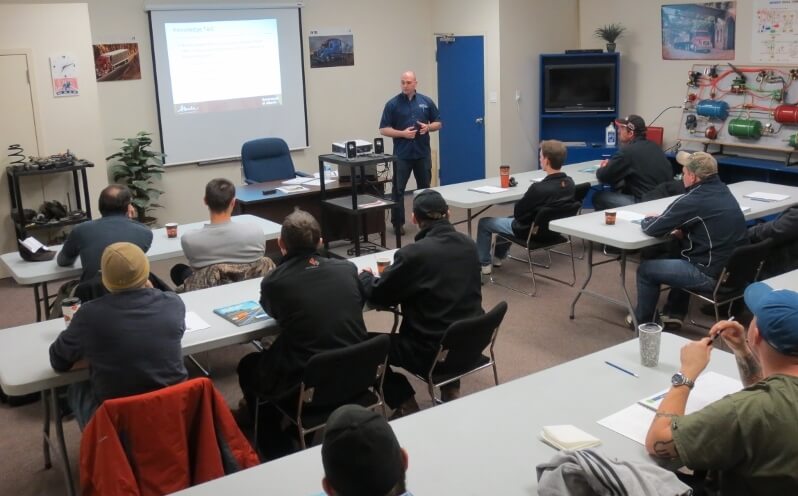The Future of Truck Driving in Alberta: How Training Programs are Adapting
As Alberta’s transportation industry grows, so does the need for skilled truck drivers. With an increasing demand for freight movement, especially in urban and rural areas, many aspiring drivers are turning to professional truck driving schools for training. This surge in demand has prompted truck training programs to evolve, ensuring that students are well-equipped for the ever-changing landscape of the trucking industry. From the latest technology in training to new driving standards, training programs across Alberta, including truck driving school St. Albert and truck training Edmonton North, are adapting to prepare drivers for the future.
A Growing Industry Demands Skilled Drivers
The truck driving industry in Alberta is in high demand, largely due to the province’s vast geography and thriving sectors such as oil, agriculture, and retail. As transportation remains vital to Alberta’s economy, qualified truck drivers are needed to maintain the supply chain. However, the training required to become a professional driver has become more intricate. It’s not just about passing a driving test anymore—it's about mastering modern tools, safety practices, and working in an ever-evolving environment.
Technology Integration in Truck Driving Training
As technology continues to advance, so does the way truck driving schools approach training. Truck training Edmonton North has already started to integrate technology into the learning process. Simulators, GPS, and fleet management software are being used to replicate real-world conditions, allowing trainees to experience challenges that go beyond typical road tests. This approach provides hands-on experience while keeping students in a safe, controlled environment.
Simulated Training: Simulators replicate driving in various conditions, from harsh weather to heavy traffic, helping students develop quicker reflexes and problem-solving skills.
Electronic Logging Devices (ELDs): Drivers now use ELDs to monitor driving hours and ensure they comply with regulations. Training programs now include education on how to use these devices effectively.
Automated Trucks: With self-driving technology making strides, some programs are beginning to incorporate lessons on the future of automated driving systems.
The Push for Advanced Safety Standards
Safety is at the forefront of any truck driving school, and the standards are only becoming stricter. With larger trucks and more goods being transported, the risk of accidents increases. Truck driving school St. Albert is responding by prioritizing defensive driving courses, advanced safety protocols, and new technologies to ensure that drivers know how to handle every situation.
Defensive Driving: Advanced defensive driving strategies are taught to avoid accidents. These skills help drivers anticipate potential risks and react appropriately.
Regulations and Compliance: With changing laws regarding hours of service and driver wellness, students are taught how to stay compliant with the latest regulations, making sure they can work within legal and safe boundaries.
Preparing Drivers for Changing Industry Needs
The trucking industry is undergoing rapid transformation, and truck training is working to address these changes by training drivers for new trends in the market. From eco-friendly trucks to ride-sharing delivery services, drivers must be prepared for innovations that can alter their daily routine.
Eco-Friendly Technologies: Green technologies, such as electric trucks, are making their way into the fleet. Training now includes educating drivers on how to operate and maintain these eco-friendly vehicles.
Logistics and Freight Management: With the rise of online shopping, there’s an increased need for quick and reliable delivery services. Truck training programs are incorporating lessons on logistics management to help drivers navigate these new demands.
On-the-Job Training Opportunities
As the need for truck drivers grows, hands-on experience has become even more important. The best truck driving schools, including those in truck driving school are providing students with real-world training opportunities. By partnering with local fleets and transportation companies, schools ensure that students get a taste of the challenges they will face on the job, from navigating busy cities to managing delivery schedules.
Increased Fleet Partnerships: Trucking schools are collaborating with local transportation companies to offer practical training opportunities that give students real exposure to the field.
Job Placement Support: Schools also offer job placement services, helping graduates secure positions in a competitive job market.
The Road Ahead: Adapting to New Trends
The future of truck driving in Alberta looks promising, but it requires constant adaptation to new trends and regulations. As the industry continues to evolve, so will the training programs. The integration of technology, safety measures, and new industry needs will ensure that truck drivers remain skilled and prepared for the challenges ahead.
The trucking industry’s future hinges on continuous innovation, and truck driving school St. Albert and truck training Edmonton North are poised to meet these demands. Whether it’s incorporating eco-friendly vehicles, preparing for automation, or teaching new safety standards, the next generation of truck drivers will have the tools they need to succeed.
Cameron Driver Education is committed to providing comprehensive truck driving programs that keep up with industry changes. Whether you’re just starting or looking to upgrade your skills, we offer the training you need to succeed in the evolving world of trucking.


Comments
Post a Comment